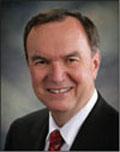Wal-Mart names Mike Duke its new CEO and president
BENTONVILLE, Ark. —Mike Duke’s name may be unfamiliar to those in the chain drug industry, but that will change early next year when he replaces Lee Scott as president and chief executive officer of Wal-Mart.
For the past three years, Duke has served as vice chairman of Wal-Mart’s international division and has understandably spent much of his time outside of the United States, where Wal-Mart operates roughly 3,300 stores in 13 countries. While Duke was immersed in streamlining and expanding the operations of the international division—the company exited Germany and South Korea, increased its presence in China and Brazil and entered India—major healthcare developments unfolded domestically. Wal-Mart launched generic drug-pricing programs, developed electronic medical records, engaged critics of its benefits programs and positioned itself for a seat at the table with a new administration eager to reform the nation’s healthcare system.
Although Duke will need to get up to speed quickly on a broad slate of domestic issues, he isn’t a complete stranger to Wal-Mart’s domestic business. He served as president and chief executive officer of Wal-Mart’s U.S. stores division from April 2003 to September 2005. Duke’s career at Wal-Mart began in 1995 when he was hired as senior vice president of distribution after a 23-year career in the department store business. That same year, Lee Scott was plucked from his role as executive vice president of logistics to serve as executive vice president of merchandise and sales, a move that put him on the path to rapid advancement that would see him named president and chief executive officer just five years later.
In early 2000, Duke was named executive vice president of logistics, and just four months later, he was named executive vice president of administration and given additional responsibilities for Wal-Mart’s support divisions, including real estate, legal and corporate affairs. In April 2003, Duke was named president and chief executive officer of the Wal-Mart stores division to replace Tom Coughlin, who was elevated to the role of vice chairman. When Coughlin retired in January 2005 and was subsequently indicted and convicted for fraud, Duke assumed additional responsibilities for logistics, finance and compliance.
The move to the international division came in September 2005 when Duke and then president and chief executive officer of Wal-Mart International John Menzer essentially switched jobs, and both were elevated to the position of vice chairman. That move brought clarity to Wal-Mart’s succession strategy as Scott’s often embattled tenure as chief executive officer and the company’s long stagnant stock price had investors anxious for a change at the top. It was a subject Scott addressed at the company’s 2006 shareholders meeting when he indicated he would be around for several more years.
Wal-Mart underwent a massive amount of change during the past few years, which served to right the company’s domestic ship at the most opportune of times as an economic downturn had price sensitive shoppers flocking to its stores.
“Wal-Mart is very well-positioned in today’s economy, growing market share and returns, and is more relevant to its customers than ever,” Duke said. “Our strategy is sound, and our management team is extremely capable. I am confident we will continue to deliver value to our shareholders, increase opportunity for our more than 2 million associates and help our 180 million customers around the world save money and live better.”
Duke also was named to the Wal-Mart board and officially assumes chief executive officer duties on Feb. 1, 2009. In that capacity, it is expected he will have frequent contact with Scott, who will remain on the payroll through Jan. 31, 2011. Scott will continue to serve on the board of directors and hold the position of chairman of the board’s executive committee.
That Duke was tapped to succeed Scott wasn’t a surprise, but the timing stuck some analysts as odd given that the company was in the throes of the holiday season in late November when the announcement was made.
“This is a big day for us, and some of you might be wondering why we are making the change at this time,” Wal-Mart chairman Rob Walton wrote in an e-mail to employees. “I think Lee said it best when he told me, ‘This is a great job, but you can’t do it forever, and at that point you have an obligation to find the right time for a transition.’”
Walton continued, “We think the right time is now, a time of strength and momentum for our company. As you know, our customers are relying on us more than ever in the current economic environment, and we are well-positioned to serve them now and in the future. Our management team is strong. Our strategy is sound, and Mike [Duke] has been actively involved in developing and executing this strategy.”
Wal-Mart is on track to generate record sales of $400 billion and profits of roughly $13.6 billion this year, while many other retailers are expected to report declining sales and profits amid a worldwide slowdown in consumer spending.
Much of that momentum is occurring at the U.S. stores division where Eduardo Castro-Wright has served as president and chief executive officer for the past several years. In conjunction with Duke’s appointment, Wal-Mart elevated Castro-Wright to the role of vice chairman and gave him added responsibility for global procurement.
“Eduardo Castro-Wright has a history of delivering results for our company,” Walton said. “As president of Wal-mart U.S., Eduardo has a vision for our brand and has built a strong team of senior leaders who have led the business to its current market-leading performance. We believe his international experience will also help drive success in our global procurement organization.”


